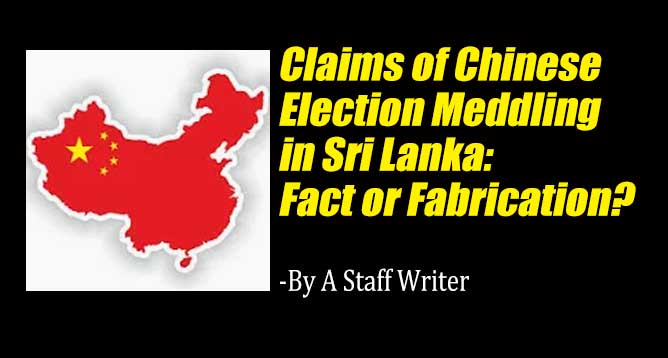-By A Staff Writer

(Lanka-e-News -25.Aug.2024, 9.15 pm) In recent years , the Daily Mirror has raised alarm bells with allegations that the Chinese government is meddling in Sri Lanka’s electoral process by bribing politicians. The publication, citing the US Media outlet highlighted alleged Chinese interference during the 2015 election, suggesting a continuation of these practices in the upcoming 2024 polls. However, the credibility of these claims has been called into question, with critics noting that the Daily Mirror’s stance appears increasingly influenced by Indian-backed narratives.
China has long maintained strong ties with Sri Lanka, dating back to the historic Rice-Rubber Pact, which laid the foundation for bilateral cooperation. Over the years, China’s support for Sri Lanka has intensified, especially during periods when the country was in critical need of investment. Notably, when India opted out of participating in key projects like the Colombo Port City and Hambantota Port, China stepped in, becoming Sri Lanka’s largest investor.
Given China’s substantial economic stake in Sri Lanka, it is natural for Beijing to closely monitor the country’s political landscape. Stability in Sri Lanka is crucial for safeguarding Chinese investments, and Beijing has consistently reiterated its commitment to assist Sri Lanka through initiatives like debt restructuring. However, allegations that China is using its influence to back specific candidates, like the National People’s Power (NPP) leader Anura Kumara Dissanayake, lack concrete evidence. The accusations seem more speculative than factual, driven by competing geopolitical interests rather than verified data.
The narrative of Chinese election interference has gained traction in certain media circles, driven partly by India’s strategic concerns. Observers point out that India’s influence in Sri Lanka is also substantial, and some of these stories may be a reaction to the growing Chinese presence on the island. Critics argue that India, particularly under the guidance of National Security Advisor Ajit Doval, is wary of any potential repetition of the political instability witnessed in Bangladesh. The failure of Indian intelligence to anticipate events in Bangladesh is now being cited as a cautionary tale, with some suggesting that India’s response has been to shift blame onto Chinese activities in Sri Lanka.
For its part, the NPP has denied receiving any foreign funding, asserting that its campaign is financed solely by contributions from Sri Lankans, including those living abroad. The party’s leadership emphasizes its independence, dismissing claims of external backing as baseless rumors intended to tarnish its reputation.
As the election approaches, the debate over foreign influence is likely to intensify. While accusations of Chinese interference make headlines, the lack of substantiated evidence leaves room for skepticism. In an era of shifting allegiances and strategic maneuvering, it remains unclear whether these claims are genuine or part of a larger geopolitical contest playing out in Sri Lanka’s political theater.
---------------------------
by (2024-08-25 15:51:02)
Leave a Reply